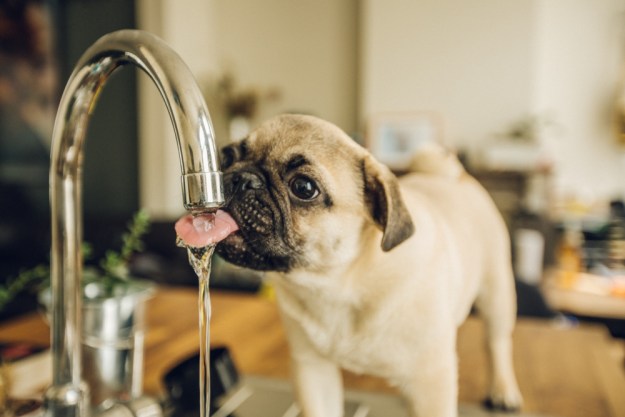
Whether your pup suffers from chronic stomach upset, diarrhea is never fun to deal with. There’s never a good time for it, but unfortunately, it happens to us all every now and again — your dog included. You may notice your pup eating grass or other nonfood items, but there’s a good chance you’ll notice the loose and irregular bowel movements before anything else.
- What can I give my dog for diarrhea? Foods and ingredients that can make a difference
- What soothes a dog’s stomach and helps with diarrhea? Try these easy DIY tricks if you don’t know where to start
- What can I give my dog for diarrhea to make it go away quickly? Here’s what you’ll want to consider
- When to take your dog to the vet for a case of diarrhea
If you’ve been wondering, “What can I give my dog for diarrhea?” this one is for you. Read on for all the answers you wish you’d found earlier, from DIY remedies to helpful foods you may already have in your cabinet. Here’s how to treat canine diarrhea at home.
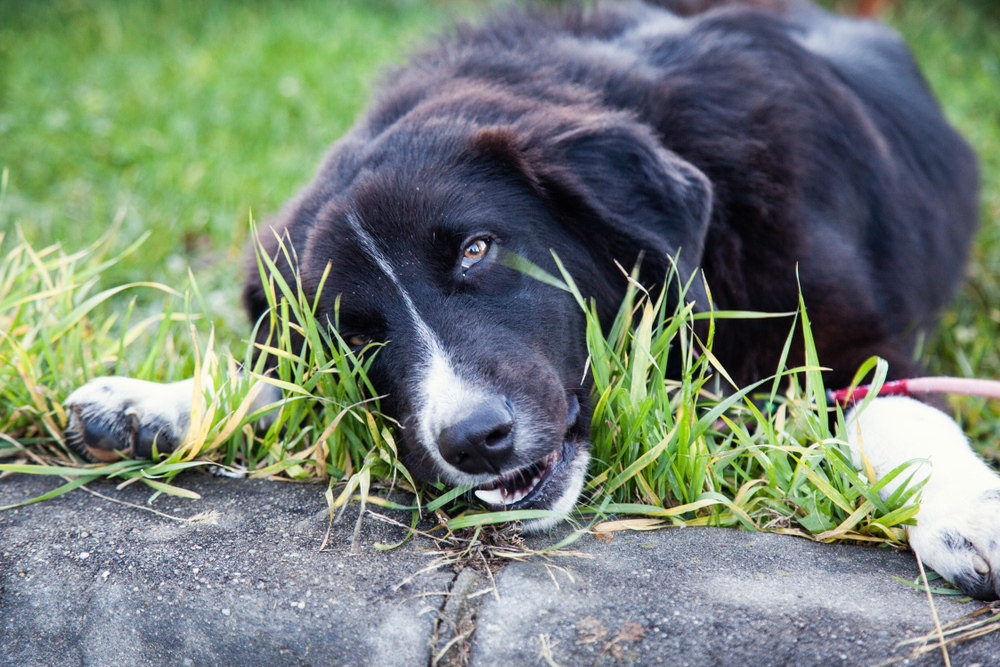
What can I give my dog for diarrhea? Foods and ingredients that can make a difference
No one wants to make an unnecessary trip to the vet’s office, especially your pup. Luckily, diarrhea on its own probably won’t need a full checkup. Still, you should inform your vet before taking on some of these at-home remedies. Others, however, are as safe and simple as preparing a bland meal or two. Whatever you choose, be sure to keep an eye on your furry friend until they’re back to normal.
These are the best foods for dog diarrhea, according to the experts
It may surprise some, but it’s true that eating, not withholding, certain foods can help with canine diarrhea. However, not all dogs react the same to any food or remedy, so don’t worry too much if this doesn’t do the trick.
When your fur baby is on the road to recovery, these same foods will be the best to add back in first. They are bland and non-irritating to the stomach, which is exactly what your pet needs right now.
White rice and unseasoned, boiled chicken is a staple in the canine recovery diet — just ask the veterinary pros with the American Kennel Club (AKC). It helps give your pet the nutrients they need to stay healthy while avoiding any extra ingredients that may upset their stomach.
A little bone broth poured over the chicken and rice, or even served alone, just might entice your dog to eat. If you buy your broth, watch out for added sodium and seasonings, which can do more harm than good. This won’t be a worry if you make bone broth from home.
Thanks to probiotics, a small amount of cultured dairy products, like yogurt and cottage cheese, can help your pup’s gut bacteria balance itself out. Of course, you should opt for something else if you have a lactose-intolerant pooch at home.
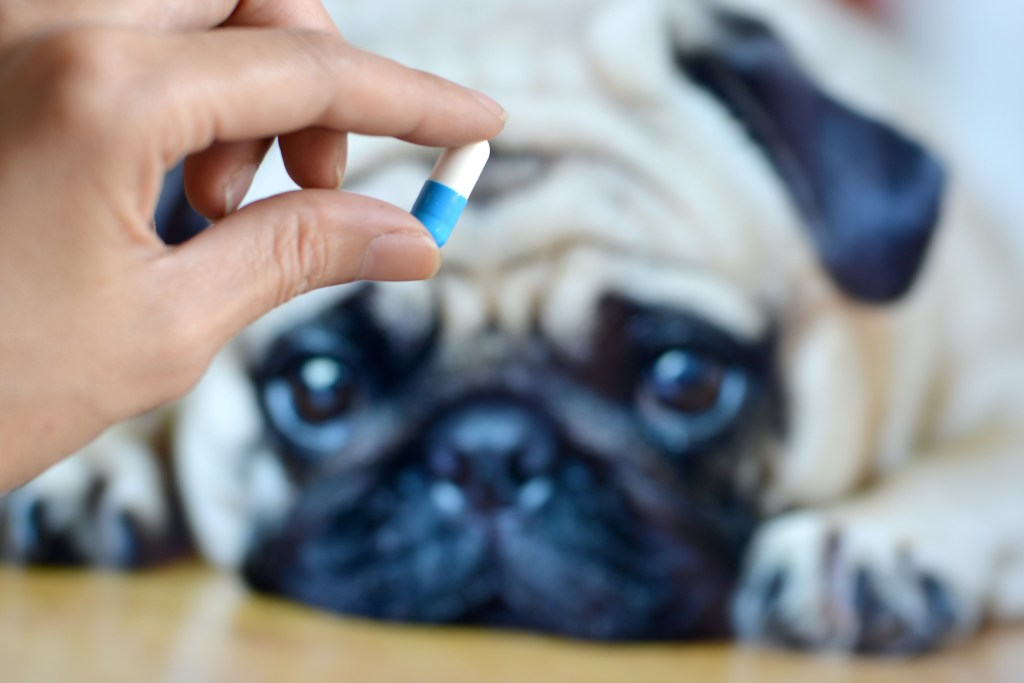
What soothes a dog’s stomach and helps with diarrhea? Try these easy DIY tricks if you don’t know where to start
Although some foods can work miracles regarding canine diarrhea, you may need to wait a while before letting your pup indulge. Here’s how to help soothe your dog’s stomach when they’re experiencing loose bowel movements:
Fasting and hydration can be helpful for some cases of canine diarrhea
Before feeding your dog even the blandest of foods, some cases require 12 to 24 hours of fasting beforehand. The AKC recommends offering your pet small amounts of water often throughout the day, as diarrhea can be dehydrating. If you can get the go-ahead from your veterinarian, you can also give your dog a bit of Pedialyte or other unflavored electrolytes. This is when broth can come in handy, too!
Stop dog diarrhea with pureed or powdered pumpkin
This fall-favorite vegetable is a fantastic natural remedy for diarrhea in some dogs, though it can also effectively treat constipation. Pumpkin on its own is full of fiber, iron, and important vitamins — which keep your pup feeling strong by increasing intestinal absorption of these nutrients.
Plain pureed pumpkin is a great option for dogs, though some canned varieties can hide sugar or spices. Always read the ingredient list! When in doubt, you can always search for a pumpkin puree or powder made especially for dogs.
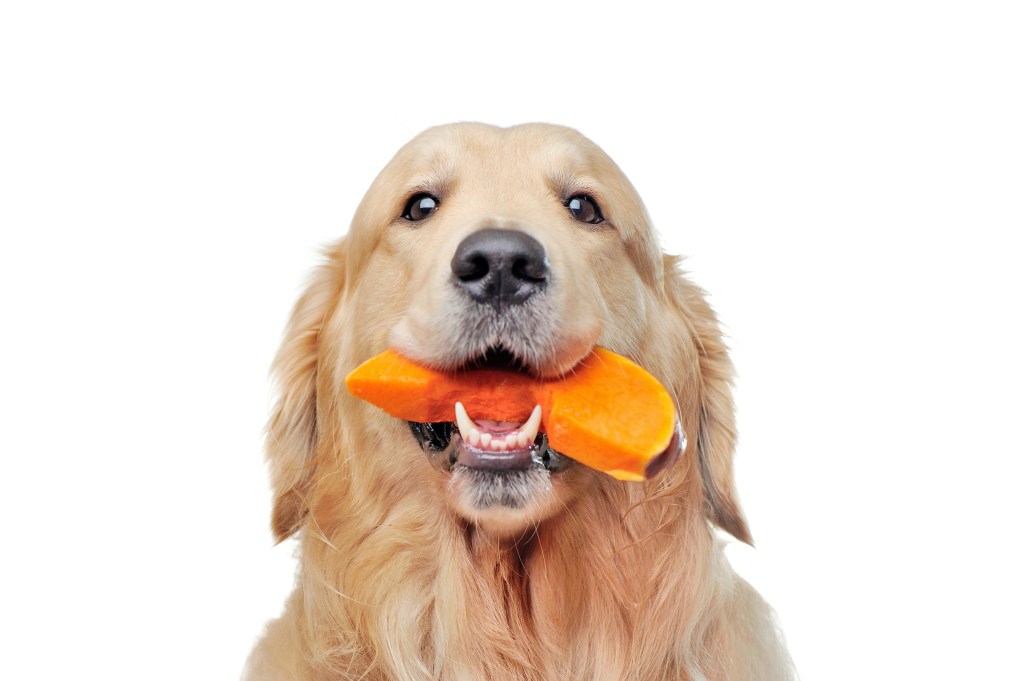
What can I give my dog for diarrhea to make it go away quickly? Here’s what you’ll want to consider
Although many foods and nutrients can help combat canine diarrhea, some options may be more effective than others. It’s best to check in with your veterinarian before trying out any medications, even if they’re over the counter, as not all diarrhea comes from the same root cause.
Stop diarrhea with over-the-counter medications and supplements
You don’t necessarily need a vet’s prescription to stop your pet’s irregular BMs, though caution should always be exercised when using medicines or supplements for your dog. Anti-diarrhea liquids, chews, and pills can be bought at almost any pet store, though your vet may have a favorite to recommend.
In some cases, notes Dr. Jerry Klein with the American Kennel Club, you may give your pup a small dose of Pepto Bismol to relieve symptoms. Typically, 1 teaspoon for every 10 pounds of body weight is an ideal dose, though even large dogs shouldn’t exceed more than a few teaspoons at a time. This medication does carry some risk of intestinal irritation and bleeding, so ask your vet before jumping in.
Probiotics for dog gut health can prevent, and even treat, dog diarrhea
Probiotics are another great option for keeping your dog’s digestive system regulated, and they can be purchased easily over the counter. This good bacteria comes in a powder form — like Purina’s FortiFlora packets — or bite-sized probiotic treats for training and playtime. Your dog won’t even know they’re taking medication!
Although you have several options for treating your dog’s diarrhea at home, nothing replaces a veterinarian’s care. If the problem persists, you may need to make a visit to narrow down the root cause of your pup’s tummy troubles. Trust us, you’ll be glad you did!
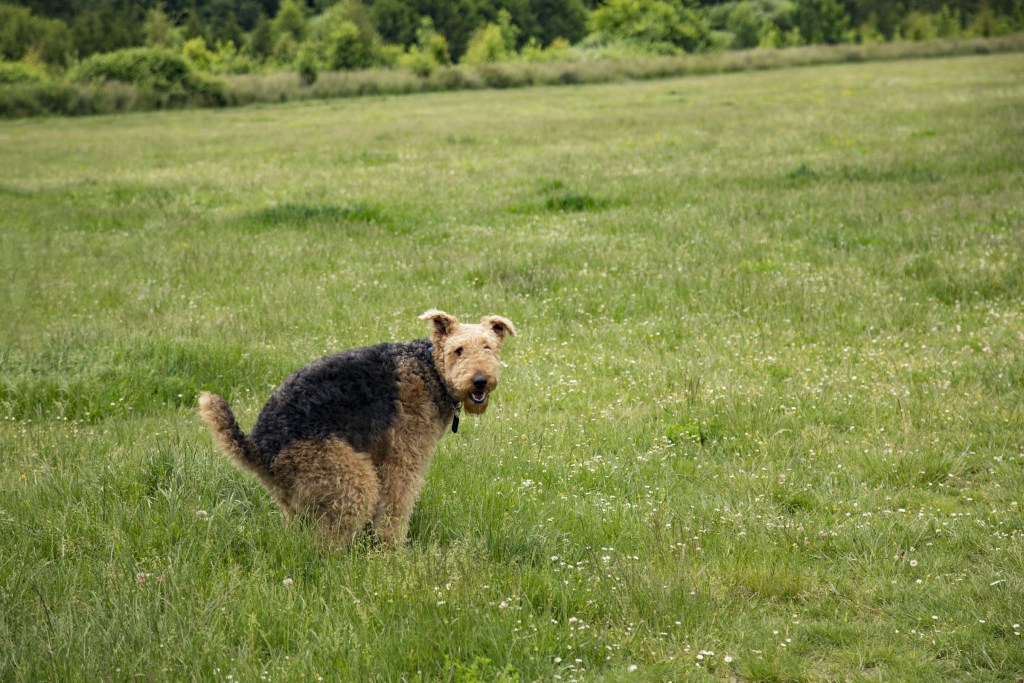
When to take your dog to the vet for a case of diarrhea
Even though most cases of loose stools won’t be a matter of concern, there can be times when the situation becomes more serious. Hopefully, you’ll already be watching your dog, so you will see their symptoms and make the best choice. When in doubt, a vet visit never hurt anyone (other than your wallet)!
Some signs that your pup should visit the vet for their diarrhea include:
- Preexisting health conditions, such as Cushing’s disease, diabetes, or cancer
- Diarrhea that persists despite remedies that have been successful in the past
- Any symptoms of dehydration in dogs, such as panting, thick saliva, or dry nose and gums
- Long duration of diarrhea (more than a few days)
- Other physical symptoms, such as lethargy, vomiting, weakness, or fever
Dogs on medications should also visit their vet to rule out any complications from the medication or the condition it treats. This will also allow the veterinarian to ensure your pet is decently hydrated. Even if the hospital trip is more of a precaution, safe is always better than sorry.
There are so many remedies for dog diarrhea, many of which you can administer at home. Veterinarians will always be there if your furry friend needs them, so don’t panic if you notice loose stools from your dog.
Editors' Recommendations
- Why does my dog have a bald patch on their tail? Here are the answers you need
- Looking for signs your dog has ticks? These telltale symptoms mean you have a flea or tick problem
- Xylitol is dangerous for dogs: 10 surprising products that contain it as a hidden ingredient
- What is the best food for older dogs? These 6 vet-approved kibbles and canned foods won’t steer you wrong
- Is your dog’s breathing problems old age or something else? What to know




